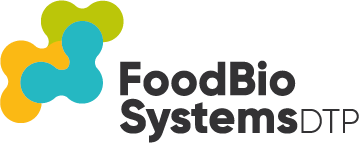Doctoral researchers at Aberystwyth University

Olugbenga Samuel Babatunde
2022-26 cohort
Project title: Is it a Fluke or is it Reproducible: Understanding Isolate Variation in Fasciola hepatica for Diagnostic Potential
Academic partner: University of Reading. I have a CASE Studentship and the project is supported by Ridgeway Research Limited
Why is your project important to or how is it relevant to the UK food system?
My project on the biochemistry of Fasciola hepatica is crucial for the UK food system. By identifying specific biomarkers in liver fluke through proteomics, it aim to improve diagnostics of this parasite and ensuring the safety of food supply and the health of livestock.
What have you enjoyed most about DTP training so far?
I enjoyed the monthly research presentations by fellow DTP students not only did it serve as a valuable platform for sharing individual research project progress but also foster a sense of community and collaboration. These sessions offer a welcomed break from my workspaces, providing an opportunity to gain exposure to diverse developments in the food system and reinforcing the supportive and collective nature of the DTP community.
What challenges have you met so far in your project? And how did you overcome them?
My Ph.D. research focused on the biochemistry of Fasciola hepatica, aiming to generate an in-depth proteomic data for diagnostic biomarker identification. Navigating through the proteomic techniques, particularly mass spectrometry, posed a challenge, but through proactive collaboration with experienced colleagues and hands-on lab experience, I overcame the hurdles and fostered a supportive research environment within the academic community.
What are you looking forward to doing next in your project?
The upcoming phase of my research involves a significant progress as I plan to undertake the next objective in my project at the University of Reading. Specifically, I will be conducting Liquid AP (MA)LDI Fingerprinting under the guidance of my co-supervisor. This phase constitutes an independent exploration into mass spectrometry for a year, representing a crucial element in advancing my research.
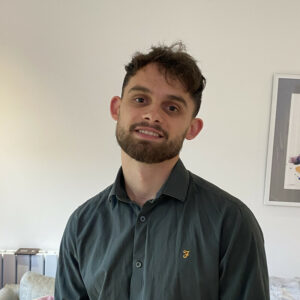
Will Barnes
2022-26 cohort
Project title: Rethinking Cultured Meat (CM) Growth Medium: Can Grassland Plant-Derived Supplements Sustainably Support CM Production?
Academic partner: University of Reading. I have a CASE Studentship and the project is supported by Cellular Agriculture Ltd
Why is your project important to or how is it relevant to the UK food system?
My project looks at improving the sustainability of cultured meat media formulations – one of the major bottlenecks towards scale up of cultured meat technologies. The UK food system is in need of alternative solutions to protein production to support the growing population and mitigate climate change – I believe cultured meat will play a large role in addressing these issues.
What have you enjoyed most about DTP training so far?
I really enjoyed the EIT food training course as it gave me a newfound appreciation for the UK food system and how my project fits into it. I also enjoyed Summer School, it was great to meet the other DTP students in person and discuss our projects and experiences.
What are you looking forward to doing next in your project?
I am looking forward to testing the compounds I have spent the last year isolating and analysing from grass on animal muscle stem cells to assess whether they are a suitable candidate in cultured meat media formulations. It is exciting and very rewarding to see different parts of my project come together after spending my first year getting trained on all the different subject areas and techniques!
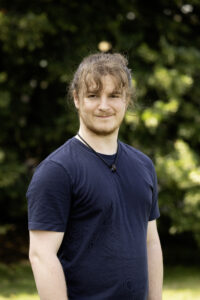
Luke Barnett
2021-25 cohort
Project title: Film of the Future – Producing an antiviral, antimicrobial, biodegradable plastic from seaweed
Academic partner: Cranfield University
I have a CASE studentship and the project is supported by a food manufacturing company.
What is your project about ?
I’m using the components of brown seaweeds to produce a plastic film for use within the food packaging industry. The addition of these seaweed components will produce a biodegradable, antimicrobial and antiviral film which will limit the transfer to microorganisms.
What led you to choosing a PhD project with the FoodBioSystems DTP?
My aim was to conduct research in microbiology and doing this PhD has enabled me to do this. The DTP gave an opportunity to get involved with a research partner in the relevant industry and I’m gaining a wider understanding of how research can be applied to the industrial environment.
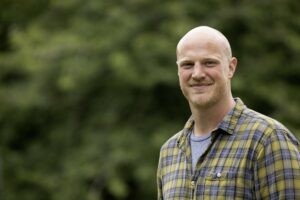
David Evershed
2023-27 cohort
Project title: GrainQuest – using Artificial Intelligence and high-resolution multimodal imaging to dissect the developmental and genetic basis of seed composition
Academic partner: Queen’s University Belfast
What is your project about?
Cereal seeds are the main contributor of calories to the human diet. Their widespread growth and consumption make them key to the food system, but their multi-nutritional composition could be improved. A better understanding of the genetic basis of nutrition of these seeds may be possible to achieve using modern imaging techniques and AI, allowing for targeted crop improvement efforts.
What have you enjoyed most about DTP training so far?
Having come from a small rural seaside town, this training programme has massively broadened my horizons both academically and personally. The DTP has introduced me to new friends, new ideas and new ways of thinking that should stand me in good stead for my PhD and beyond.
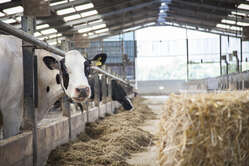
Jacky Kuo
2024-28 cohort
Project title: The importance of sleep: using AI (video-based motion capture systems) to improve the health, resilience and productivity of dairy cows
Academic partner: University of Surrey
What is your project about?
Milk is an excellent source of protein, calcium, vitamin D, and other essential nutrients that are crucial for bone health and overall wellbeing in both children and adults. Using AI systems to monitor the general wellbeing of dairy cows can help ensure a consistent supply of high-quality, low-cost milk, while also supporting the welfare of the cows and reducing the workload for dairy farmers. Dairy production and consumption in the UK rank among the top 15 in the world, making it a vital industry to support in order to maintain a strong and secure domestic food supply.
What challenges have you met so far in your project? And how did you overcome them?
So far, the challenges I’ve encountered in my project reflect the same issues faced by many UK dairy farmers. There is a noticeable decline in farming personnel with specialised dairy knowledge, and farms are increasingly in need of technological solutions to help fill this gap. My PhD project aims to be part of that solution. Since the start of my research, I’ve actively connected with local agri-tech companies, such as HerdVision, to develop and expand my current work, and to learn from their previous projects, which align closely with the goals of my own.
What are you looking forward to doing next in your project?
Within the first week, I was able to begin gathering pilot data from animals, and I’m now looking forward to engaging with local companies (including the University Diary Farm) to help steer my data collection in a direction that could be mutually beneficial.

Emily Radford
2022-26 cohort
Project title: Engineering myxobacterial super predators to fight crop disease
Academic partner: University of Reading
Why is your project important to or how is it relevant to the UK food system?
The global population is rapidly expanding so the need to produce more food in a sustainable manner is vital. Wheat is a staple crop grown worldwide, but production is threatened by fungal diseases which cause a loss in yield, quality and nutrition of the grain. By engineering naturally ubiquitous predatory bacteria to more effectively kill these fungi, we can introduce a biocontrol alternative to chemical treatments to promote sustainable farming with lesser environmental impacts.
What have you enjoyed most about DTP training so far?
I have enjoyed the opportunities to travel to conferences and the DTP summer school to be able to share my research with others and gain new perspectives to improve my research.
What are you looking forward to doing next in your project?
The next steps in my project involve technical genetic modification protocols to improve the predatory ability of the myxobacteria against the disease-causing fungi. I am looking forward to learning these new techniques, and eventually to observe how they can promote plant health when applied to wheat.

Louis Samuel
2023-27 cohort
Project title: Unpicking the Causes of Infertility in Wheat Triggered by Temperature Stress
Academic partner: University of Reading
Why is your project important to or how is it relevant to the UK food system?
Wheat is a dietary staple of billions of people worldwide and is one of the most important UK food crops, making it a crucial node of its food system. Meiosis and pollen production in wheat are particularly sensitive to heat stress, an increasingly common and alarming issue due to climate change. My project aims to understand and remedy this sensitivity by investigating the impact of heat stress on wheat at a cellular and genetic level, and working towards making heat-tolerant crops.
What have you enjoyed most about DTP training so far?
Meeting the cohort at the Summer School was interesting and exciting. The monthly webinars where students showcase their research allows me to stay in the loop on the research done within the DTP, and the range of extracurricular opportunities offered by the DTP is great for staying connected to food science as a whole.
What challenges have you met so far in your project? And how did you overcome them?
Wheat is not a plant I’m used to working with, and investigating meiosis and pollen production comes with its complications. Repeating mock experiments until I grasp a technique or identify a wheat growth stage has been key to my understanding of the plant in these early stages. Trying out various techniques allowed me to visualise wheat reproductive stages under different lights, and is contributing to my gradual understanding of the crop.

Christopher Smith
2022-26 cohort
Project title: Combining molecular biology and computer modelling to enhance control of liver fluke in livestock across agricultural landscapes
Academic partner: Queen’s University Belfast
Why is your project important to or how is it relevant to the UK food system?
Liver fluke is an important parasite of sheep and cattle which causes millions of pounds of damage per year and has growing resistance to drugs. The parasite uses a snail as part of its life cycle. By using environmental DNA we can better understand which environmental factors influence the presence of the snail, and thus develop better strategies to prevent livestock infection.
What have you enjoyed most about DTP training so far?
The Summer School. It was great to meet everyone from different universities and find out about the wide range of research being conducted.
What are you looking forward to doing next in your project?
Starting the fieldwork on farms in spring to go out and take samples from the snail habitats.

Felix Townsend
2020-24 cohort
Project title: A receptor-ligand module that triggers cell death in plants: A killer in disguise
Academic partner: University of Reading
What is your project about and why is it important?
My project involves a highly widespread systems found in crop species throughout the world. This process known as self-incompatibility prevent self-fertilisation and thus inbreeding in plants. By understanding the proteins, processes and metabolic pathways involved in this vital system, we can help aid in crop yield prediction and the development of smart herbicides.
What have you enjoyed most about DTP training so far and what are you looking forward to next in your project?
The DTP training is diverse and entertaining, even under the constrains of the COVID-19 restrictions. It’s been a great way of getting to know the other students in your cohort, as well as developing skills and confidence in completing your PhD.
I am looking forward to learning a new technique known as Blue Native PAGE. This will allow me to understand my protein (PrpS) further by showing if it forms complexes or not. This will put more pieces of the puzzle together in elucidating this fascinating protein.
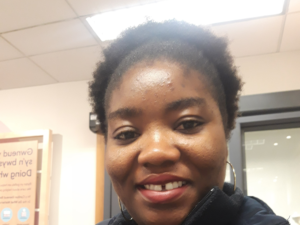
Juliet Vickar
2021-25 cohort
Project title: Integration of food intake biomarker data with minimal self-reported dietary information to assess eating behaviour and evaluate nutrient intake in individuals and populations.
Academic partner: University of Reading
What is your project about and why is it important ?
This project is about providing important tools for nutrition research, a capability to demonstrate objectively links between diet and health. This will have a profound impact on the food industry and public health internationally.
What led you to choosing a PhD project with the FoodBioSystems DTP?
The advertised project fitted perfectly into my research interest. I want to progress into the field of translational research aiming at closing the gap between science, food, and nutrition policies. I’m also keen to obtain an excellent learning experience and a commitment to collaborate with other researchers to champion the fight against non-communicable diseases.
